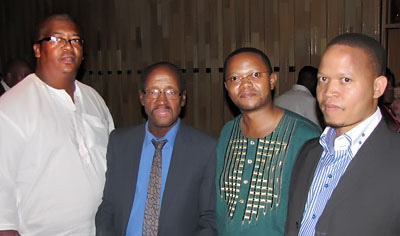 |
Prof. Chris Landsberg, Dr Pule Matjoa, Prof. Kwandiwe Kondlo and Herbert Maserumule, the main speakers during the launch of the ANC Centenary Seminar Series.
Photo: Christiaan van der Merwe |
The Centre for Africa Studies at the University of the Free State (UFS) recently launched its series of seminars commemorating the centenary celebrations of the African National Congress (ANC). The launch of the series took place on 30 November 2010, with the seminar series running from February 2011 until February 2012, the year of the centenary celebrations of the ANC.
Along with UFS staff members and students, various special guests also attended the launch of the seminar series, including former Premier Ms Winkie Direko, representatives of the office of the current Premier and the Vice-Chancellor and Rector of the UFS, Prof. Jonathan Jansen. Prof. Jansen praised the Centre for Africa Studies for its vision in establishing the seminar series and added that he would be a regular attendee when the seminars kicked off in 2011.
The seminar series is the brainchild of Prof. Kwandiwe Kondlo, Head of the Centre for Africa Studies at the UFS. Prof. Kondlo explained that the aims of the seminars were to delve into the legacy of the ANC from a firm historical perspective, as well as to develop a firmer understanding of the dynamics of contemporary South Africa. He stressed the scholarly and academic nature of the seminars, hoping for robust and critical debate amongst future audiences about the topics at hand. Publications in journals and books at the end of the series will be the secondary objective of the Centre.
The three guest lecturers for the launch were Dr Pule Matjoa, Prof. Chris Landsberg and Herbert Maserumule. Dr Matjoa, an ANC veteran, elucidated the history of the party from an insider’s perspective while Prof. Landsberg spoke about the past and present foreign policy of the ANC. Mr Maserumule examined the ruling party’s economic thinking, with special focus on the distinctions between a democratic and developmental state.
The question-and-answer session after the lecture produced lively debate, which set a premise for the rest of the series. The first seminar in the series will take place on 4 February 2011.